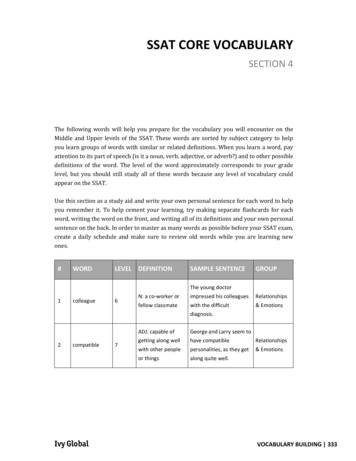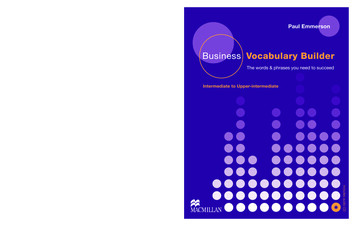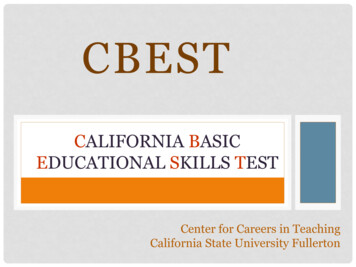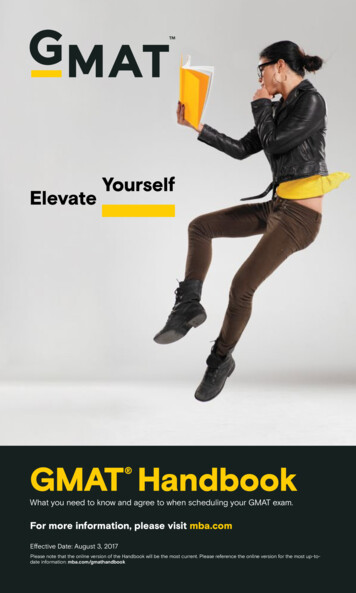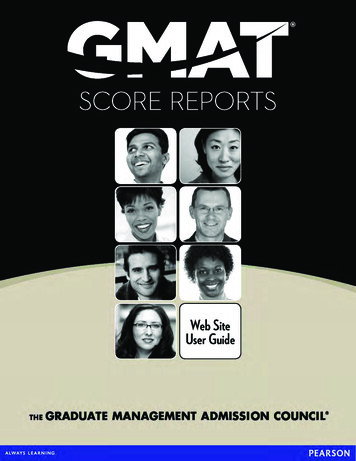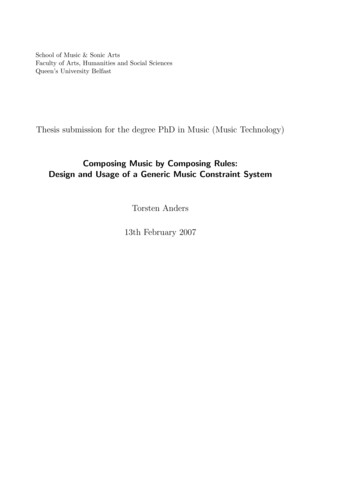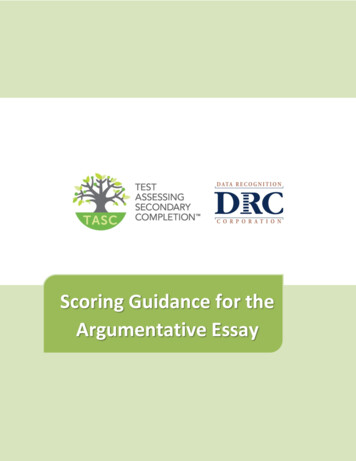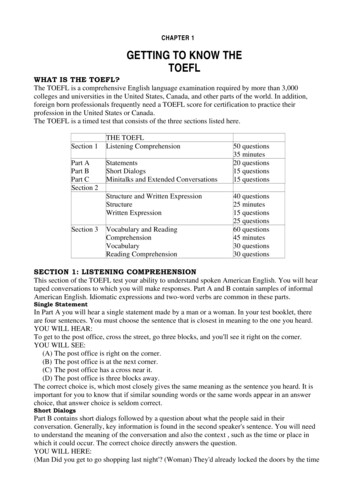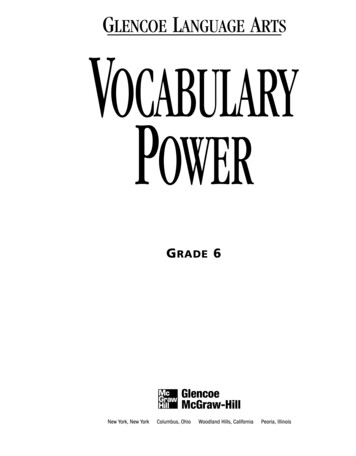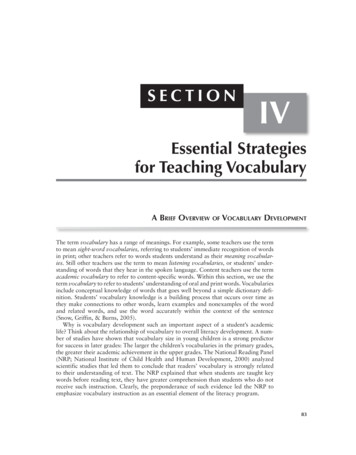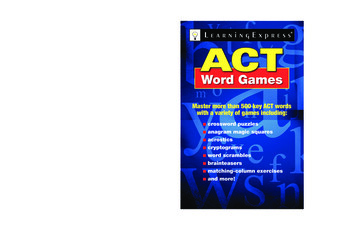
Transcription
TEST PREPARATIONUS 13.95LearningExpressImprove Your Vocabularyand Score Higher on the ACT!ACT Word Games includes more than 500 key test wordsand a variety of fun vocabulary-building activities:ACT Word GamesNeed a break from practice tests and flashcards? ACTWord Games is a fun way to brush up on standardized testvocabulary. By completing a series of challenging games,students learn new words and review old ones, to prepare forthe writing and reading sections of the ACT.ACTWord GamesMaster more than 500 key ACT wordswith a variety of games including:nanagram magic squaresnword scramblesnacrosticsnbrainteasersncrossword puzzlesnmatching-column exercisesnncryptogramsnhidden meaning puzzlesnAll word games include expert tips and hints designedto help you remember vocabulary and achieve success onthe ACT!nnnnnPrepare for a Brighter Future ncrossword puzzlesanagram magic squaresacrosticscryptogramsword scramblesbrainteasersmatching-column exercisesand more!
ACTWordGAmesmichele r. Wells Newffirs.indd 1Y or k7/13/11 3:05 PM
About the AuthorMichele R. Wells has been a writer and editor of test prep materials forcompanies such as The Princeton Review and LearningExpress, LLC,since 2001, and volunteers regularly with the Everybody WINS PowerLunch program, a NYC-based literacy program for kids. A senior editorat one of the world’s largest publishing companies, she has more thana decade of experience in nonfiction book and multimedia publishing.Michele holds a bachelor’s degree in dramatic writing and art history,and is pursuing a master’s in film, both from New York University.iiiffirs.indd 37/13/11 3:05 PM
AcknowledgmentsJennifer Pollock, editor extraordinaire, conceptualized the idea forthis book and deserves a big thank you. Thanks also to Sheryl Posnick,who not only edited but dealt with various obstacles to make sure thatthis book came together as it should. Additional thanks to Eric Titner,production editor at LearningExpress, who worked to make this bookthe best it could be.Andrea Laurencell is in the trenches, teaching vocabulary andtest preparation to students every day. Merci to you for reviewing themanuscript, and for your feedback and advice.And finally, writing two books in six months is difficult. Thanksto my family (Rita Sr., Rita Jr., Cheryl, John, Nathan, Colby, and Blake)for understanding where my priorities had to be this year.ivffirs.indd 47/13/11 3:05 PM
Table of ContentsIntroduction . viiPART I: Understand Basic Vocabulary SecretsChapter 1Chapter 2Chapter 3Know Your Common Prefixes and Suffixes . 3Learn Root Words . 11Deconstruct and Rebuild. 19PART II: Build an Awesome Vocabulary . . . with GamesChapter 4Chapter 5Chapter 6Chapter 7Chapter 8Chapter 9Chapter 10Chapter 11Crossword Puzzles. 27Anagrams. 45Acrostics . 57Jumbles . 65Word Searches. 75Matching Column Games . 87Double-Word Puzzles . 99Cryptograms . 115vftoc.indd 57/13/11 3:06 PM
TABLE OF CONTENTSPART III: Set a Foolproof StrategyChapter 12Chapter 13Chapter 14Planning and Preparing . 123Anxiety-Busting Exercises . 131Test-Day Checklist. 135Glossary . 137viftoc.indd 67/13/11 3:06 PM
IntroductionIf you’ve picked up this book, you’re interested in increasing your ACTscore. That means you’re already aware of the effect this exam can haveon your future, and that’s great. But you’ve also got homework to do,football games to attend, musical instruments and Spanish verbs topractice, chores to do, maybe an after-school job and other responsibilities, and—oh yeah—a social life to maintain. You don’t have time tospend on more stuff related to school, much less exams that are probably months away at this point, right?But think about it like this: You probably play games of somekind or another, either on your mobile phone, computer, or a gameconsole, several times a week—maybe even every day. Playing thosegames can increase your online ranking, and maybe even make yourfriends jealous when you beat their high scores, but playing the gamesin this book can have a positive effect on your future. They can helpyou build a killer vocabulary and put yourself on stronger ground forgaining admission to the college of your choice.Before we get to just how these games can help increase your ACTscores, let’s run through a bit about the test itself, so you’ll know exactlywhat to expect on test day.viiflast.indd 77/13/11 3:06 PM
INTRODUCTIONWhat Is the ACT Exam?The American College Testing (ACT) assessment is one of two mainstandardized tests used by admissions teams to evaluate your potentialfit as a student at their college or university. The ACT measures whatyou’ve learned in various academic subjects—see “What Skills AreTested on the ACT?” for more information. (The other main standardized test is the SAT, which is an aptitude exam designed to measure theverbal and mathematical skills you will need as you progress throughyour academic career.)What Is the ACT Used For?Your high school may use your ACT score to evaluate the way yourteachers are performing. They use these scores to decide which areasneed improvement within the school as a whole, and which studentsneed additional assistance in specific subject areas.College admissions teams use your ACT score as part of theirevaluation process, to decide if you will be a good addition to the diverse group of students at that school. But that’s not the only thingthey look at.Admissions teams look at individuals, not just at scores andgrades. They want well-rounded students, not just those who can churnout perfect tests or straight As. Are you an athlete? Maybe you’re anactor or dancer? How about an artist? Do you do volunteer work, speakanother language, or organize events for your school? Make sure youmention all these things on your application, because admissions teamsare looking for students who can contribute to the diversity of campus life.Don’t worry if your GPA isn’t perfect—just be sure to highlightthe great work you do in other areas of your life. And with the help ofthis book, your English, reading, and writing ACT scores are sure tobe included in the “things you do well” section!viiiflast.indd 87/13/11 3:06 PM
INTRODUCTIONWhat Skills Are Tested on the ACT?The ACT is a national achievement and placement exam that testsyour knowledge of key subject areas: English, mathematics, reading,and science. The optional ACT Plus Writing assessment also includesa 30-minute essay test that evaluates your writing skills.The English section is made up of 75 multiple-choice questions.The mathematics section comprises 60 questions. The reading andscience sections are made up of 40 questions each. The optional writing section consists of a short essay on a particular theme. Overall, theexam takes a little over four hours to complete (with an additional halfhour if you choose to take the ACT Plus Writing assessment).Who Takes the ACT?According to the American College Testing Program, Inc., the organization that administers the ACT, approximately 1.6 million studentstake the ACT every year. But here’s a little secret—not all of them prepare for the exam in advance. By using this book, you’re giving yourselfan edge over the competition!Where Do I Sign Up for the ACT?Registration forms and information for the ACT exam can be foundonline at www.actstudent.org. You can sign up for the ACT online witha credit card or request a paper application, which you can completeand mail in with a check or money order.When Do I Take the ACT?The ACT exam is administered six times a year, on Saturday mornings.You can find a current schedule online at www.actstudent.org/regist/dates.html. You may take the ACT up to twelve times—but only onceixflast.indd 97/13/11 3:06 PM
INTRODUCTIONper national test date. Most students take the test twice: once as a highschool junior, and once as a senior. According to the American CollegeTesting Program, Inc., among the students who took the ACT morethan once, 55 percent increased their composite score on the retest.Where Do I Take the ACT?You can take the ACT in one of many national and international testingcenters. When you register by mail or at www.actstudent.org, you’ll begiven a list of testing locations in the area of your choosing; just pickthe one that is most comfortable and convenient for you. It’s also a goodidea to do a dry run before the actual test date—figure out how you’llget to the test site around the same time of day as your test so you aren’tsurprised by road closures, construction, train or bus delays, bad online directions, or other things that can make you late (and stress youout) the day of the test.If there is no ACT exam center within 50 miles of your home, ifyour religious beliefs prohibit you from taking tests on a Saturday, orif you are homebound or confined, you may request arranged testing.Information on these arrangements can be found at www.actstudent.org/regist under “Request arranged testing.”How Is the ACT Scored?The first thing that happens after you take the ACT is that yourmultiple-choice answers are calculated into a score by computer. Pointsare awarded as follows: For the English, mathematics, reading, and sciencereasoning sections, one point is added for each correct answer (nothingis subtracted for incorrect answers), for a score between 1 and 36. TheEnglish, mathematics, and reading tests will also include subscores ranging from 1 to 18. These scores are averaged for a composite score.If you choose to take the optional writing test, that section willbe scored manually by two trained readers. You’ll receive a writingscore that falls between 2 and 12 (or 0 if your essay is blank, illegible,xflast.indd 107/13/11 3:06 PM
INTRODUCTIONoff-topic, not written with a No. 2 pencil, or written in a language otherthan English), for a combined English and writing score of between 1and 36, and comments from the essay scorers. Your writing score willhave no effect on your composite score.How Is My Score Reported?You can view your scores online at www.actstudentorg if you have astudent account and tested through National or International Testing(see the ACT website for more information). Scores are available onlineapproximately two and a half weeks after you complete the test. If youchose to take the ACT Plus Writing assessment, your writing scoreswill be posted online approximately two weeks after your multiplechoice scores appear. Score reports are also mailed to your home address three to eight weeks after you complete the test (or after yourwriting scores have been calculated if you took the ACT Plus Writingassessment).Your ACT scores will be sent to the colleges or universities youauthorize for score reports. You can also opt to have your scores sent toyour high school by checking “yes” in the registration section.How Does My Score Rate?In 2010, the national average ACT composite score was 21. This average score is acceptable for many colleges and universities. Someschools, such as Ivy League universities, typically require a score ofat least 29.The highest possible score on the ACT is 36. Typically, less thanone-tenth of one percent of all students who take the ACT receive ascore of 36. Keep in mind that your score is just one of the tools usedby admissions officers to rate your potential fit for that school.What Are the Subscores?Subscores on the ACT are broken down into the following categories: usage/mechanics and rhetorical skills for English; pre-algebra/elementary algebra, algebra/geometry, and plane geometry/trigonometryfor mathematics; and social studies/sciences and arts/literature for reading. These subscores provide you with greater detail on your performance,xiflast.indd 117/13/11 3:06 PM
INTRODUCTIONto show you the areas in which you need to improve; however, they arenot used for college admissions purposes.What’s the Deal with National Rankings?Your score report will also include national rankings. These show thepercentage of recent high school graduates who took the ACT andscored at or below each of your scores. These rankings are included togive you a sense of your strengths and weaknesses in each of the fourgeneral subject areas tested on the ACT, and in each of the seven subscore sections.What If I Didn’t Get the Score I Wanted?You can always retest if you don’t do as well as you’d have liked on theACT—in fact, you can take the exam up to twelve times. But unlikethe SAT, which allows you to hide your lowest scores, all your officialACT test scores will appear on the score reports that are sent out toapproved colleges and universities.Now that you know what the exam is, how it is used, and what toexpect on test day, let’s get down to what you really want to know—howto use this book to get great results on the ACT.xiiflast.indd 127/13/11 3:06 PM
IP a r tUNDERSTANDBASICVOCABULARYSECRETS01 1-10.indd 17/8/11 11:56 AM
01 1-10.indd 27/8/11 11:56 AM
c h a P t e r1Know YourcommonPrefixes andSuffixesKnowing the meaning of common prefixesand suffixes will help you figure out the definition of many familiar and unfamiliar wordson the ACT exam.What exactly are Prefixes and Suffixes?Prefixes and suffixes are attached to base words to add information andmeaning. A prefix is an attachment that comes before a base word orstem. A suffix is an attachment that comes after the existing base wordor stem. A stem is the main part of a word—the part that prefixes orsuffixes are attached to—but might not actually be a full word by itself.The word repayment, for example, is made up of the prefix re(which means again), the stem pay, and the suffix -ment (which meansaction or process). So with an understanding of suffix, prefix, and stems,you could figure out that the meaning of repayment is the process ofpaying money back.301 1-10.indd 37/8/11 11:56 AM
KNOW YOUr cOMMON PreFIXeS aND SUFFIXeSCommon PrefixesThe following are some examples of prefixes you might encounter whenstudying ACT vocabulary words, along with their meanings.a-, ab-, an- (apart or without)ad- (toward or near)ante- (before)anti- (against)auto- (self)bi- (two)bio- (life)circum- (around)co-, com-, con- (with or together)de- (away or off)di-, dis- (not or apart)dys- (bad or problematic)em-, en- (restrict or cause)equi- (equal)ex- (former)extra-, exo- (outside of)fore- (in front of or before)hyper- (over)hypo- (under)geo- (earth)im-, in- (not)inter- (between)micro- (tiny)mis- (wrong)mono- (one)multi- (many)neo- (new)non- (not)ob-, oc-, of-, op- (against, on,over, or toward)omni- (all)pan- (all)para- (beyond)peri- (around or about)poly- (many)post- (after)pre- (before)pro- (favoring or for)re- (again)retro- (backward)semi- (half)sub- (under or below)super- (exceeding or above)therm-, thermo- (heat)trans- (across)tri- (three)un- (not)Common Suffixes-able, -ible (capable or worthyof)-acy (state or quality)-age (condition)-al (act or process of, orpertaining to)-ance, -ence (state or quality)-ary (related to)-ate (become)-dom (place or state of being)-en (make or become)-er, -or (one who)-esque (like or reminiscent of)-gram, -graph (written or drawn)-hood (class)401 1-10.indd 47/8/11 11:56 AM
KNOW YOUr cOMMON PreFIXeS aND SUFFIXeS-ic, -ical (pertaining to)-iou, -ous (characterized by)-ish (having the quality of)-ive (having the nature of)-less (without)-log, -logue (speech)-logy (the study of)-oid (resembles)-ory, -tory (relating to)-ous (possessing)-phile (strong love for)-phobe, -phobia (fear of)-ship (position held)-y (characterized by)Word detectiveKnowing these prefixes and suffixes can help you deduce themeaning of many vocabulary words instantly, so familiarize yourself with the ones you don’t already know for an instant vocabpower-up!Derivational SuffixesThere are suffixes that change the meaning of the base word or stem.These are called derivational suffixes (don’t worry, you don’t need toremember that), and some common examples are:-able, -ible (capable of being)-ation, -sion, -tion (state ofbeing)-ful (notable for)-fy (make or become)-ify (make or become)-ily-ise, -ize (become)-ism (belief or doctrine)-ist (one who)-ity, -ty (having the quality of)-ment (condition or result of)-ness (state of being)Derivational suffixes can combine with each other, too, but the spelling may change (as in predictability, which is predict combined with-able and -ity).Okay, now that you’ve reviewed some prefixes and suffixes andhow they work, let’s put that knowledge into action!501 1-10.indd 57/8/11 11:56 AM
KNOW YOUr cOMMON PreFIXeS aND SUFFIXeSexercise 1Each word below contains a prefix. Using what you learned, choose thebest available definition.1. microcosma. to make something largerb. a sign of fearc. a smaller system which is representative of a larger oned. a vast expanse of land2. foreshadowa. to darkenb. to suggest something in advancec. to followd. to retaliate3. engendera. to bring into existence; to causeb. knowledgec. to promise to marryd. to grow4. comminglea. to bring forwardb. to mix or blendc. a quick movementd. to soften5. extraordinarya. from the pastb. exceptional or unusualc. from aboved. large601 1-10.indd 67/8/11 11:56 AM
KNOW YOUr cOMMON PreFIXeS aND SUFFIXeSexercise 2Each word below contains a suffix. Using what you learned, choose thebest available definition.1. historicala. dryb. extremely funnyc. something that belongs to a mand. relating to what happened in the past2. provenancea. place or source of originb. a giftc. the act of being proper or correctd. happiness3. fiefdoma. a type of instrumentb. unhappinessc. a domain controlled by a dominant person or lordd. a small area4. traveloguea. a vacationb. a languagec. confrontationd. the journal or documentation of a trip5. humanoida. resembling or having the characteristics of a humanb. false or fakec. a very young persond. an alien701 1-10.indd 77/8/11 11:56 AM
KNOW YOUr cOMMON PreFIXeS aND SUFFIXeSexercise 3Each word below contains a prefix and a suffix or derivational suffix.Using what you learned, choose the best available definition.1. decentralizea. to cause to be more populatedb. in the very middle of an areac. to move downwardd. to move away from an established main point2. monographa. a work of writing on a single subjectb. a diverse groupc. a drawing made with many colorsd. a signature3. apprehensiona. to climbb. fearful expectationc. a course that comes before a meald. the state of being angry4. nullifya. to take apartb. to make invalidc. to bring togetherd. to make liquid5. approbationa. a decisionb. restrictionc. concernd. official approval801 1-10.indd 87/8/11 11:56 AM
KNOW YOUr cOMMON PreFIXeS aND SUFFIXeSanswersExercise 11. c. a smaller system which is representative of a larger one2. b. to suggest something in advance3. a. to bring into existence; to cause4. b. to mix or blend5. b. exceptional or unusualExercise 21.2.3.4.5.d.a.c.d.a.relating to what happened in the pastplace or source of origindomain controlled by a dominant person or lordthe journal or documentation of a tripresembling or having the characteristics of a humanExercise 31.2.3.4.5.d.a.b.b.d.move away from an established main pointwork of writing on a single subjectfearful expectationmake invalidofficial approval901 1-10.indd 97/8/11 11:56 AM
01 1-10.indd 107/8/11 11:56 AM
c h a p t e r2Learn rootWordsNow that you know the meanings that prefixes and suffixes bring to vocabulary words,you’re ready to review the most commonroots—the base of the words to which prefixes and suffixes are attached. Once youknow these, you can guess the meaning ofalmost any unfamiliar word on the ACTexam.root WordsEnglish is made up of words derived from Latin and Greek roots, as wellas words from German, French, and other languages. Any familiarityyou have with other languages can be an advantage when trying toguess the meaning of a word, because if you can recognize even a smallpart of it, you’ve improved your chances of figuring out the definition.1102 11-18.indd 117/8/11 11:59 AM
LearN rOOt WOrDSList of Common Root Wordsacro (top, height, tip)aer, aero (air)aesth, esth (beauty)agr, agri, agro (farm)alg, algo (pain)ambi, amphi (both)ambul (move)ami, amo (love)andr, andro (male)anim (spirit, life)ann, enn (year)anth, antho (flower)anthrop, anthropo (human)apo, apho (away, separate)aqu, aqua (water)arbor (tree)arch (most important)archa, archae, archi (ancient)art (skill)arthr, arthro (joint)aster, astr (star)act (to do)audi (to hear)avi (bird)bar, baro (pressure)bell, belli (war)bene (good)bibli (book)bio (life)blast (cell)capt, cept (capture, hold)cardi, cardio (heart)carn, carni (flesh)caust, caut (burn)cede, ceed (yield)ceive, cept (take)celer (fast)cent, centi (hundred)centr, centro (center)cephal, cephalo (head)chrom, chromo, chromat,chromato (color)cide, cise (cut)circle, circum (around)claim, clam (speak)cline (lean)cogn, cogni (learn)cred (believe)crypto (hidden)cycl (circle)dem, demo (people)dendr, dendri, dendro (tree)dent, dont (tooth)derm, derma (skin)dic, dict (speak)domin (master)don, donat (give)duc, duct (lead)dyn, dyna, dynam (power)ego (self)endo (inside)equ, equi (equal)fer (carry)flect (bend)flor, flora, fleur (flower)fract, frag (break)fug (escape)gastr, gastro (stomach)gen, gene, geno (birth)geo (earth)1202 11-18.indd 127/8/11 11:59 AM
LearN rOOt WOrDSList of Common Root Words (continued)ger (old age)gram (written)gyn (female)helic, helico (spiral)heli, helio (sun)hem, hema, hemo (blood)herbi (plant)hetero (other)homeo, homo (same)hydr, hydro (water)imag (likeness)iso (equal)ject (throw)jud, jur, just (law)junct (join)juven (young)kine, kinet (motion)lab (work)later (side)liber (free)lingu (language)loc (place)locu, loqu (speak)log, logo (word)luc, lumin (light)lun, luna, lumi (moon)mal, male (bad)mand (order)mania (madness)manu (hand)mar, mari (sea)mater, matr, matri (mother)meter (measure)migr (move)morph (form)mort (death)narr (tell)nat (born)necr, necro (dead)neg (no)nom, nomin (name)noun, nunc (declare)numer (number)ocu, op, opt (eye)op, oper (work)ortho (straight)pale, paleo (ancient)pater, patr, patri (father)path (feeling)ped, pede, pedi, pod (foot, child)phag, phage (eat)phil (friend, love)phon, phono (sound)phot, photo (light)phys (body, nature)pop (people)pseud, pseudo (false)psych, psycho (mind)pugn, pugna (fight)purg (clean)pyr, pyro (fire)rid (laugh)rupt (burst)scend (climb)sci (know)scrib, script (write)sect (cut)serv (keep)sol (alone, sun)spec, spect, spic (see)1302 11-18.indd 137/8/11 11:59 AM
LearN rOOt WOrDSsphere (ball)spir (breathe)stell (star)techno (skill)tel, tele, telo (far)tele (far away)temp, tempo (time)term, termin (end)ter, terr, terra (earth)the, theo (god)therm, thermo (heat)urb (city)vac (empty)verb (word)vid, vis (to see)Watching for WordsThere’s no way to provide a complete list of all root words thatoccur in the English language, but the list provided is a great startto figuring out many ACT vocabulary word meanings. As you gothrough your daily life, keep an eye out for more word roots, andwatch for them to reappear in other words. The more you know,the more you can figure out—and the better your vocabularywill be!Now, let’s try some exercises to put your knowledge of root word meanings to work.exercise 1Using what you learned, choose the best available definition for eachword.1. genuflecta. to runb. to bend at the kneec. to jumpd. to solve1402 11-18.indd 147/8/11 11:59 AM
LearN rOOt WOrDS2. intercepta. to make knownb. to come togetherc. to seize or hold before arrivald. to come between3. concedea. to hinderb. to returnc. to display arroganced. to yield or accept as true4. carnivorousa. looking for dangerb. feeding on animal fleshc. seeking out parties or eventsd. excitable5. inscriptiona. enrollmentb. the beginningc. the writing or dedication on somethingd. a disasterexercise 2Using what you learned, fill in the correct letters to complete the wordbase.1. An instrument used to measure the pressure of the atmosphere:meter2. Marine animals that move by expelling water from a tube underthe head: pod1502 11-18.indd 157/8/11 11:59 AM
LearN rOOt WOrDS3. Moving in a direction away from a center or axis:ifugal4. The study of the operation of aircrafts: nautics5. The act of speaking words that are to be written or transcribed:ation6. To make something move in a way that resembles lifelike action:ate7. Something done out of love for or goodwill toward others:anthropy8. To cut into: in9. The process of learning: ition10. A particular concept or understanding of beauty:etics1602 11-18.indd 167/8/11 11:59 AM
LearN rOOt WOrDSanswersExercise 11. b. to bend at the knee2. c. to seize or hold before arrival3. d. to yield or accept as true4. b. feeding on animal flesh5. c. the writing or dedication on somethingExercise 21. b a r o meter2. c e p h a l o pod3. c e n t r ifugal4. a e r o nautics5. d i c t ation6. a n i m ate7. p h i l anthropy8. in c i s e9. c o g n ition10. a e s t h etics1702 11-18.indd 177/8/11 11:59 AM
02 11-18.indd 187/8/11 11:59 AM
c h a p t e r3Deconstructand rebuildIn Chapter 1, you learned the meanings ofcommon prefixes and suffixes. In Chapter 2,you learned the meanings of common basewords. Now, it’s time to put this knowledgeto use.Let’s practice before moving on to the more complex vocabulary neededto play the games in the next section of the book, and on the ACT exam.In the following exercises, put it all together by combining basewords with prefixes and suffixes to create new words.1903 19-24.indd 197/8/11 12:00 PM
DecONStrUct aND reBUILDExercise 1Match the word parts from column A to the word parts in column Bto create words that match the definitions that follow. Some words willbe used more than once.1.2.3.4.5.6.7.8.9.10.11.12.13.14.15.16.column acolumn remandreserveunspectTo keep or store; protect.To respond or change due to a stimulus.To go over and above.To charge with an offense.To keep safe; to avoid wasteful use of.To trick; to be false.To order or send back; to return to custody.An idea.Special regard or esteem.To foretell or declare in advance.To cause to begin; to form.A command or principle intended as a general course of action.To be worthy of something.To turn aside.To acquire or come into possession.To ask with authority.2003 19-24.indd 207/8/11 12:00 PM
DecONStrUct aND reBUILD17.18.19.20.With the exclusion of.To view critically or closely.To keep back or hold.To surpass; to go ahead or in front of.Exercise 2Match the word parts from column A to the word parts in columnB to create words that match the definitions that follow. Some wordswill be used more than once. An asterisk (*) denotes that two entriesfrom column B are used (don’t forget to drop the silent e if necessary).column acolumn igrlogynarrousoptorphony1. An instrument that measures the movement of the heart.2.3.*4.5.6.7.8.9.Emitting or reflecting light.The act of moving from one country or region to another.Of or relating to a signature.One who is sworn to give a verdict in a dispute.The study of living organisms.To tell a story in detail.Of or relating to the eye.Of or relating to sound.2103 19-24.indd 217/8/11 12:00 PM
DecONStrUct aND reBUILD*10. The written story of someone’s life.*11. The study of the heart.*12. A body of people who are called on to give a verdict in a dispute.*13. Of or related to motion.*14. The state or quality of emitting or reflecting light.*15.*16.*17.*18.*19.*20.One who tells a story in detail.A person of prominence or brilliance.Not genuine; false.A signature.The act of telling or recounting a story in detail.To move from one country or region to another.Exercise 3Insert definitions for the following words based on your knowledge ofprefixes, suffixes, and base word 2203 19-24.indd 227/8/11 12:00 PM
DecONStrUct aND reBUILDanswersExercise 11. preserve2. react3. pectreserveprecedeExercise phnarrationmigrateExercise 3Answers will vary; possible answers are provided.1. bibliomania: extreme loveor passion for books2. enumerate: to determinethe number of3. vacuous: emptied; lackingcontent4. temporal: relating to time5. autobiographic: about one’sself6. paternally: relating to a father7. chromatograph: an instrument for analyzing color8. bioavailability: the rate atwhich a substance is absorbed into an organism9. amphibious: able to exist onland and in water10. anthropologic: relating tostudy of humans2303 19-24.indd 237/8/11 12:00 PM
03 19-24.indd 247/8/11 12:00 PM
IIP a r tBuild an AwesomeVocabulary . . .with Games04 25-44.indd 257/8/11 12:01 PM
04 25-44
Aug 23, 2017 · vocabulary. By completing a series of challenging games, students learn new words and review old ones, to prepare for the writing and reading sections of the ACT. ACT Word Games includes more than 500 key test words and a variety of fun vocabulary-building activiti
